Throughout history, science has shaped the way humans understand the universe, cure diseases, and build the technologies we use every day. Behind these breakthroughs stand brilliant minds whose discoveries have transformed societies across the globe. These famous scientists not only advanced knowledge but also challenged the status quo, often working against doubt, opposition, and even personal hardship.
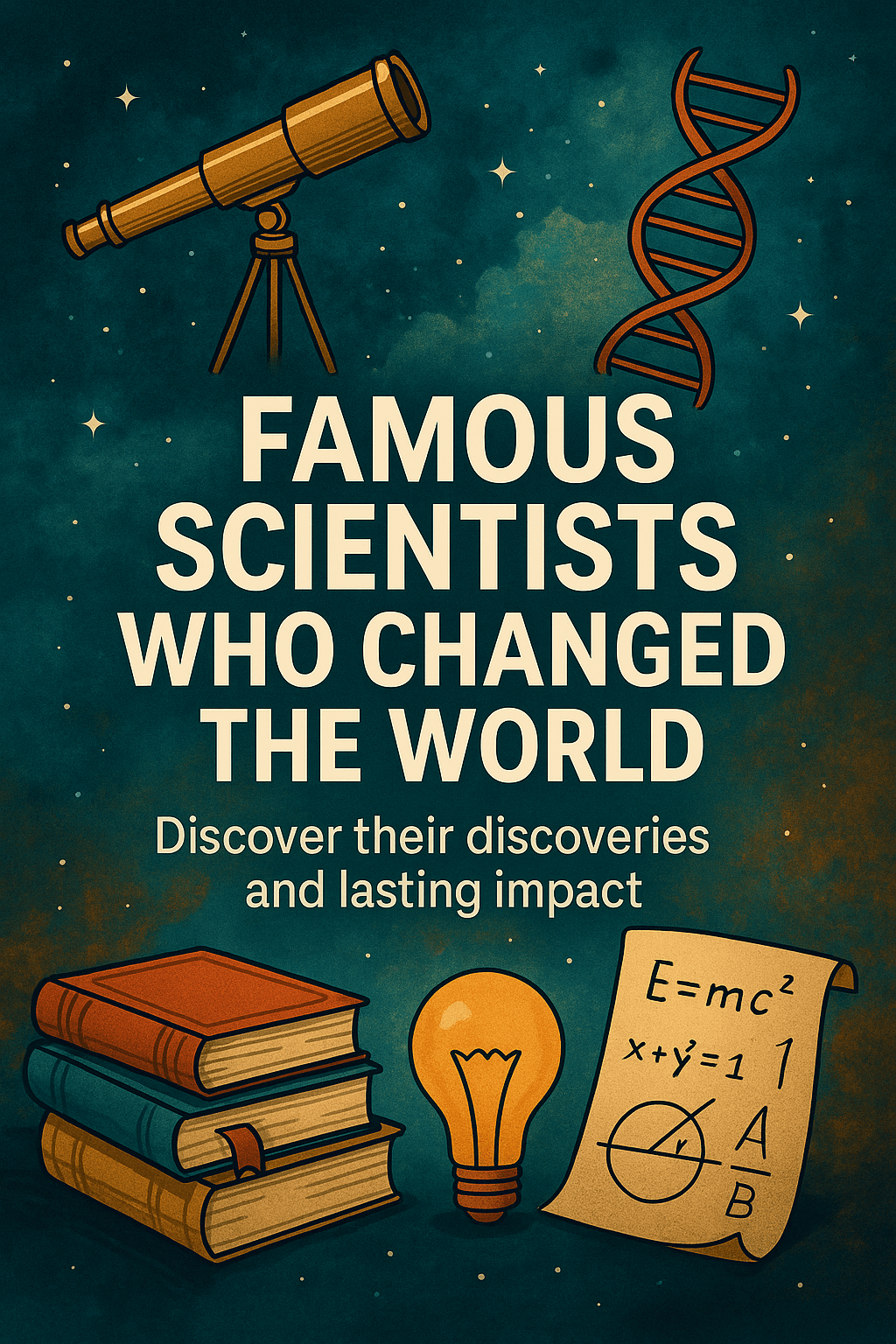
The story of science is not just about inventions and equations. It is about human perseverance, imagination, and curiosity. From ancient scientists who asked fundamental questions about nature to modern famous scientists exploring artificial intelligence and space travel, science has always been a driving force for progress.
In this article, we will explore the lives and contributions of the world’s most influential scientists. We will move through history, beginning with scientists in ancient history, journey through the Renaissance, and arrive at modern times, highlighting famous scientists in physics, chemistry, biology, technology, and beyond. We will also shine a light on famous female scientists, lesser-known figures, and lessons we can draw from their stories.
By the end, you will see how the discoveries of famous scientists continue to touch your daily life, and how their legacies can inspire the next generation of innovators.
The Role Of Scientists In Human History
Science has always been central to human progress. From agriculture to medicine and technology, the role of scientists in human history has been to expand knowledge and apply it in ways that improve lives. Scientists are often explorers of the unknown, questioning traditions and pushing boundaries to bring about transformation.
How Scientists Shaped Civilization
From the earliest civilizations to the modern world, scientists have fueled agriculture, health care, and industry. Early agricultural scientists developed irrigation and farming methods that made stable societies possible. Ancient astronomers studied the skies, not for curiosity alone, but to predict seasons for planting and harvests.
In health, early physicians experimented with herbs, surgeries, and observational techniques that extended life in small but important ways. Centuries later, famous scientists like Pasteur and Fleming would expand this into vaccines and antibiotics.
Technological progress also rests on scientific foundations. From Galileo’s telescope that opened the heavens to modern computing that opened the digital world, discoveries redefined what humanity thought was possible.
Their curiosity has given rise to discoveries like electricity, vaccines, and computers. Without their persistence, many of the innovations that define our daily lives would not exist. Scientists are the architects of progress, and their work demonstrates that human advancement is not accidental. It is built on observation, imagination, and persistence.
Ancient And Classical Era Scientists
The story of ancient scientists reminds us that curiosity about the world is as old as civilization itself. Greek philosophers, Indian mathematicians, Chinese engineers, and Middle Eastern scholars each laid stones in the foundation of modern science. Though limited in technology, their methods of reasoning, experimentation, and observation sparked traditions that endured through centuries.
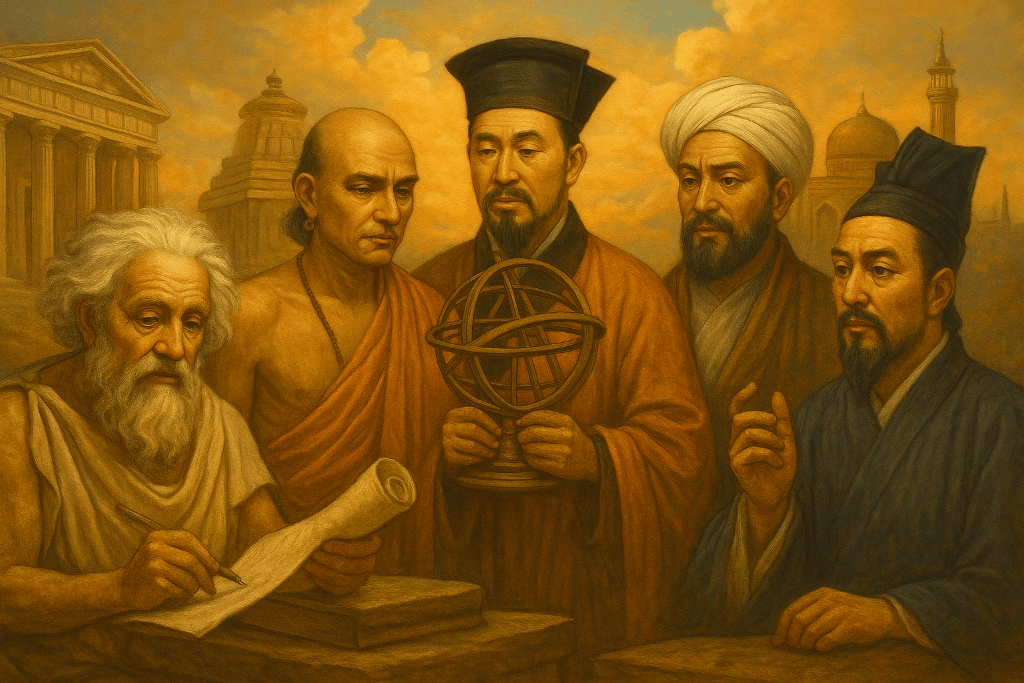
The Foundations Of Early Science
Aristotle’s contributions shaped philosophy, biology, and physics. Though he sometimes relied on logic more than experimentation, his classification of animals and theories of causation gave future scientists a framework to challenge and refine. His influence lasted for nearly 2,000 years.
Archimedes’ inventions demonstrated how mathematics could solve practical problems. He discovered the principle of buoyancy while bathing, shouting “Eureka!” and changed naval engineering with his war machines. His study of levers, “Give me a place to stand, and I will move the world,” remains iconic in physics.
Hippocrates, the “Father of Medicine,” emphasized observation over superstition, arguing that diseases had natural causes. The Hippocratic Oath, still taken by physicians, reflects his commitment to ethics and rational treatment.
Outside Greece, Indian scholars advanced mathematics with the concept of zero and astronomy with planetary calculations. Chinese thinkers developed compasses, seismographs, and medical practices that persist in traditional medicine today. Ibn al-Haytham (Alhazen), working in the Islamic Golden Age, pioneered optics and experimental methodology, influencing Western science centuries later.
These famous scientists in history provided the intellectual framework for progress. Their ideas, though imperfect, demonstrated humanity’s hunger to explain nature. Without their groundwork, the scientific revolutions of later centuries would have been impossible.
Renaissance And Enlightenment Pioneers
The Renaissance and Enlightenment were rebirths of knowledge where observation triumphed over superstition. These Renaissance scientists questioned centuries of dogma, experimented boldly, and shifted humanity’s view of the cosmos and natural laws. Their discoveries transformed Europe and paved the way for modern science.
A New Age Of Curiosity And Discovery
Leonardo da Vinci embodied the Renaissance spirit. His notebooks revealed sketches of flying machines, tanks, and anatomical studies that anticipated modern discoveries. While many of his inventions remained theoretical, his interdisciplinary thinking bridged art, science, and engineering.
Nicolaus Copernicus challenged Earth’s central place with his heliocentric theory. His ideas, published in On the Revolutions of the Celestial Spheres, overturned centuries of Ptolemaic astronomy and influenced later astronomers like Galileo.
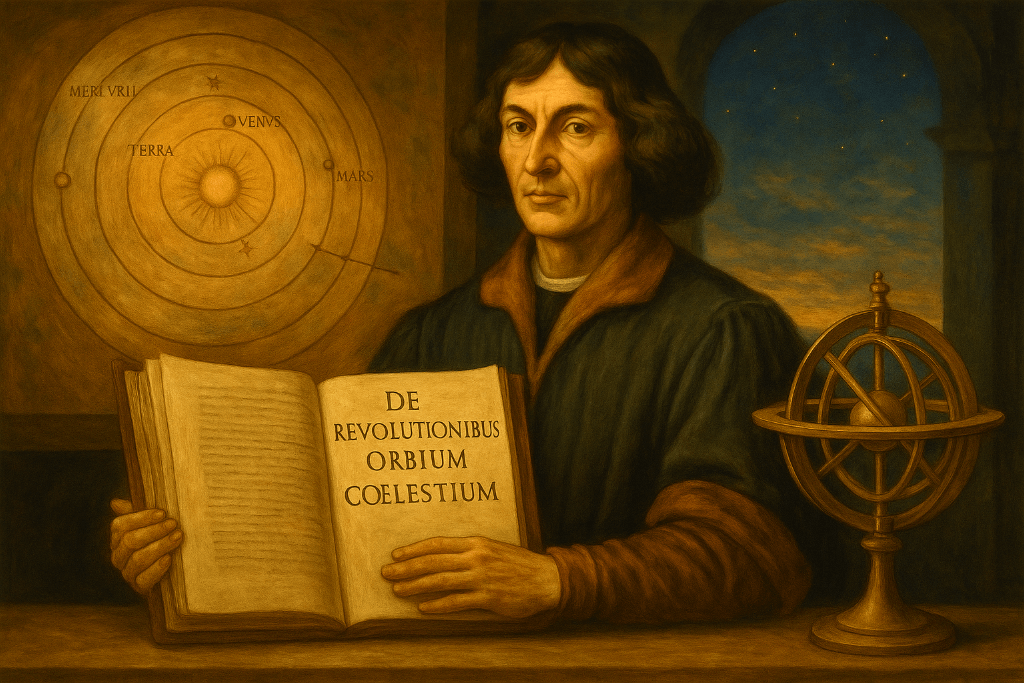
Galileo Galilei’s telescope observations of Jupiter’s moons and the rugged lunar surface confirmed Copernicus’s ideas. His insistence on evidence over authority set the stage for the modern scientific method, even at the cost of house arrest.
Isaac Newton’s laws of motion unified physics by explaining how objects move on Earth and in the heavens. His discovery of universal gravitation tied the cosmos together with mathematics. Newton’s work not only revolutionized physics but also inspired future scientists to view the universe as predictable and governed by laws.
The Enlightenment carried this spirit forward. Thinkers emphasized reason, experimentation, and freedom of inquiry. Knowledge was no longer confined to scholars but spread through books and scientific societies, inspiring revolutions in politics and industry.
This period stands as proof that famous scientists who changed the world often begin by daring to challenge the unquestioned truths of their time.
Revolutionizing Physics And Mathematics
The modern era revealed a universe stranger than anyone imagined. Physicists and mathematicians of the 20th century challenged Newton’s certainties with theories that redefined time, space, and matter itself. Their breakthroughs underpin the technologies we rely on today.
Redefining Space, Time, And The Universe
Albert Einstein’s theory of relativity redefined physics by showing that space and time are not fixed but relative. His famous equation E=mc² revealed that matter could be converted into energy, paving the way for nuclear power and nuclear weapons. His theories also made technologies like GPS possible, since satellite clocks must account for relativistic time differences.
Niels Bohr’s quantum theory introduced a new way of thinking about the atom. By suggesting electrons occupy discrete energy levels, he helped develop quantum mechanics, a field that powers everything from semiconductors to lasers.
Stephen Hawking’s black hole research advanced cosmology by demonstrating that black holes emit radiation, known today as Hawking radiation. Despite battling ALS, he became one of the most visible scientists of his time, inspiring millions with books like A Brief History of Time.
These famous physicists challenged the very nature of reality. Relativity changed how we perceive motion and gravity, while quantum mechanics suggested a probabilistic universe. Their theories not only expanded human knowledge but also created new tools and industries.
Physics and mathematics became the languages of modern civilization, turning abstract ideas into satellites, computers, and medicine.
Chemistry Trailblazers
Chemistry evolved from mystical alchemy into a discipline of measurement, logic, and predictive power. These famous chemists unveiled the hidden structures of matter, explained atomic forces, and built frameworks still taught today.
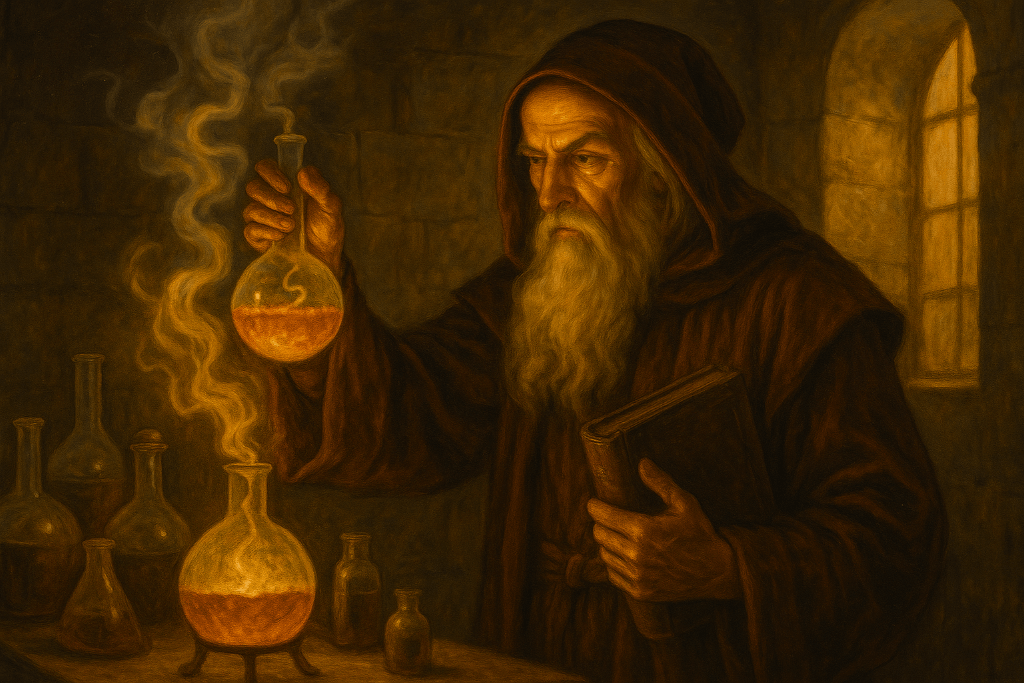
Unlocking The Secrets Of Matter And Energy
Marie Curie’s discoveries of polonium and radium pushed science into the nuclear age. Her work on radioactivity not only earned her two Nobel Prizes but also paved the way for cancer treatments through radiation therapy. Curie worked under harsh conditions, yet her contributions remain central to modern medicine.
Dmitri Mendeleev’s periodic table revolutionized how elements were understood. By arranging them by atomic weight, he predicted elements yet to be discovered, showing that science could anticipate the unknown. Today, his table organizes chemistry classes and laboratories worldwide.
Antoine Lavoisier, the father of chemistry, emphasized measurement and experimentation. By naming oxygen and hydrogen, he clarified chemical reactions and established the law of conservation of mass. His work ended centuries of alchemy and superstition, giving birth to modern chemistry.
The impact of these famous scientists on chemical inventions reaches far into daily life, from the periodic table on a classroom wall to the medical treatments in hospitals. By simplifying discoveries of famous scientists, chemistry connected the atomic scale to human health and industry.
Biology And Medicine Innovators
Life science has reshaped human health and revealed our evolutionary story. The following biology and medicine pioneers uncovered heredity, disease, and the origins of species, setting the stage for genetics, microbiology, and modern medicine.
Transforming Health And Understanding Life
Charles Darwin’s theory of evolution explained how species adapt and change over time. Before Darwin, many believed species were fixed. His insights showed life as dynamic and interconnected.
Gregor Mendel, a genetics pioneer, studied pea plants, discovering patterns of inheritance that laid the groundwork for modern genetics. His work, unnoticed during his lifetime, became revolutionary decades later.
Louis Pasteur’s germ theory shifted medicine from superstition to science. He proved microorganisms cause disease, saving lives through vaccines for rabies and anthrax. His pasteurization process continues to protect food safety worldwide.
Alexander Fleming’s discovery of penicillin changed the course of medicine. His accidental observation of mold killing bacteria gave rise to antibiotics, saving millions from infections once considered fatal.
These famous scientists in biology discoveries remind us that science is practical. Their contributions of scientists in medicine lengthened life expectancy, reduced suffering, and built the foundation for biotechnology. From vaccines to genetic engineering, their influence continues to shape our health and understanding of life itself.
Technology And Engineering Visionaries
Science alone does not build progress. Its application through engineering does. These technology visionaries transformed theories into inventions that fueled the Industrial Revolution and modern life. Their work demonstrates that science becomes truly powerful when it enters factories, cities, and homes, reshaping daily life on a massive scale.
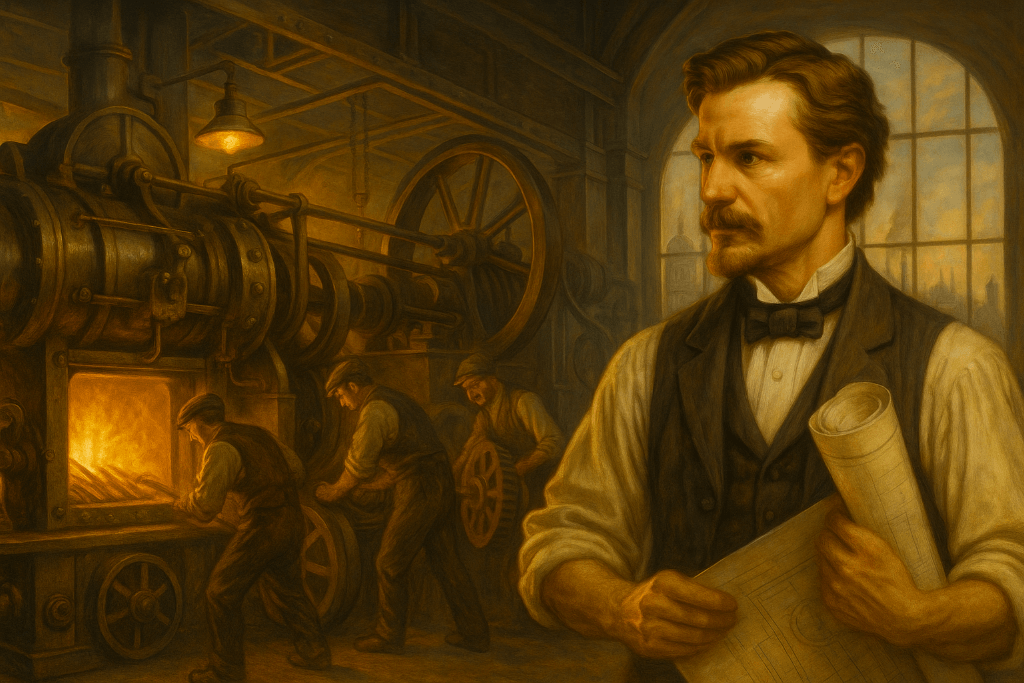
Bridging Science And Industry
Nikola Tesla’s AC electricity gave the world a reliable way to transmit power over long distances. Unlike direct current (DC), which loses efficiency quickly, Tesla’s alternating current system could light entire cities. His wireless energy experiments also foreshadowed today’s wireless communication.
Thomas Edison’s inventions made him one of the most prolific inventors in history. He didn’t just create the light bulb. He developed the infrastructure to make it practical, including power grids. Edison’s phonograph, motion picture devices, and countless patents turned abstract science into global industries.
James Watt’s steam engine improvements accelerated the Industrial Revolution. Before Watt, engines were inefficient. His design powered trains, factories, and ships, revolutionizing travel and commerce.
These famous scientists who invented machines proved that knowledge could become power literally. Their innovations didn’t just stay in laboratories but created systems that still shape the modern world. Without them, electricity, transportation, and industrialization would have progressed much more slowly.
Computer Science And Modern Technology
Few fields have transformed humanity as quickly as computing. Within a century, computers went from room-sized machines to smartphones in our pockets. This leap was made possible by a handful of brilliant computer science pioneers who imagined, designed, and built the digital foundation of the modern age.
Building The Digital Age
Alan Turing’s contributions to computer science reshaped mathematics and logic. His idea of a “universal machine” became the blueprint for modern computers. During World War II, Turing’s codebreaking at Bletchley Park helped defeat the Nazis, shortening the war and saving millions of lives. Today, the Turing Award, the “Nobel Prize of Computing,” honors his legacy.
Grace Hopper’s programming innovations made computing practical. Before her, programming required arcane machine code. Hopper’s compiler translated human-readable commands into code, paving the way for languages like COBOL. She championed the idea that computers should be accessible to non-specialists, opening the door to widespread use.
Tim Berners-Lee’s World Wide Web turned the internet into a global tool for sharing information. His vision of open access led to the hyperlinked system we use every day. Without Berners-Lee, the internet might have remained limited to specialists, rather than becoming the foundation of modern life.
These famous scientists in computer science laid the groundwork for artificial intelligence, cloud computing, and digital communication. Every email sent, app opened, or website visited reflects their vision.
Women Who Transformed Science
For centuries, women fought against barriers to education and recognition, yet their brilliance changed the course of history. These famous female scientists not only made groundbreaking discoveries but also challenged the social norms that tried to silence them. Their stories prove that science thrives when diverse voices are included.
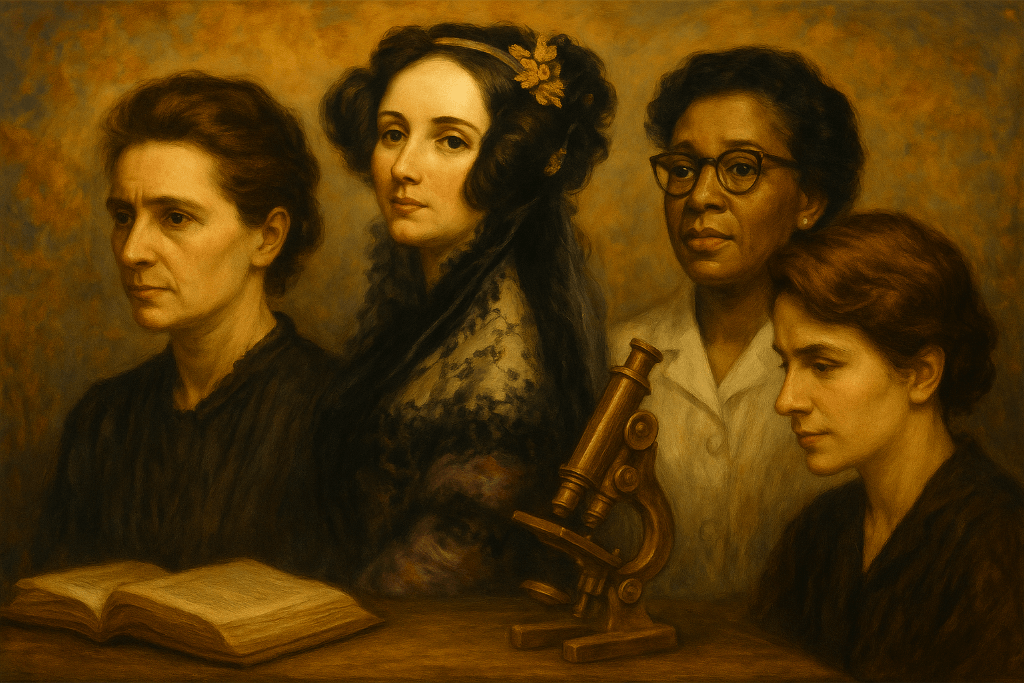
Breaking Barriers And Inspiring Generations
Rosalind Franklin’s DNA discovery provided the X-ray crystallography images that revealed DNA’s double-helix structure. While Watson and Crick received most of the credit, Franklin’s meticulous work was indispensable to one of the greatest discoveries in biology.
Ada Lovelace, the first computer programmer, worked in the 19th century, long before electronic computers existed. She envisioned how Charles Babbage’s Analytical Engine could be programmed with instructions, an idea so ahead of its time that she is now celebrated as the world’s first programmer.
Dorothy Hodgkin’s Nobel Prize in Chemistry came from her groundbreaking work in protein crystallography. By determining the structures of insulin, penicillin, and vitamin B12, she advanced medicine and biochemistry in ways still felt today.
These women scientists who changed the world remind us that genius knows no gender. Their perseverance in the face of discrimination inspires future generations of scientists, ensuring that science becomes a truly inclusive endeavor.
Lesser-Known But Influential Scientists
Not every scientist becomes a household name, yet many have shaped the world just as profoundly. These lesser-known scientists remind us that progress often depends on collaboration and the quiet persistence of overlooked pioneers.
Unsung Pioneers Of Science
Alhazen, the optics pioneer (Ibn al-Haytham), lived during the Islamic Golden Age and is often called the “father of modern optics.” His Book of Optics explained how vision works and emphasized experimentation, influencing Western scientists centuries later.
Jagadish Chandra Bose’s discoveries crossed boundaries between physics and biology. He demonstrated that plants respond to external stimuli, blending science and philosophy. He also worked on radio waves before Marconi, but his humility kept him from pursuing patents aggressively.
Chien-Shiung Wu’s nuclear physics experiments disproved the theory of parity conservation, a foundational belief in physics. Despite her contributions, the Nobel Prize went to her male colleagues, a stark reminder of how recognition often lagged behind achievement.
These underrated scientists in history highlight the collective nature of discovery. Without them, optics, plant biology, and nuclear physics would not have advanced as quickly. Their stories remind us that impact is not always reflected in fame.
The Impact Of Famous Scientists On Everyday Life
The influence of famous scientists is all around us, from the light switches we flip to the vaccines that protect us. Science does not remain in laboratories. It transforms into tools, medicines, and systems that shape our everyday lives.
Science In Daily Life
Electricity powers cities thanks to Tesla and Edison. Medical imaging, rooted in Curie’s work, saves lives daily. Darwin and Mendel’s insights form the basis of modern agriculture and genetics, while Turing and Berners-Lee shaped the digital world we live in.
The contributions of scientists to modern society are so integrated into daily life that we rarely pause to consider them. Every time we use GPS, board an airplane, or take antibiotics, we are benefiting from discoveries made decades or even centuries ago.
These famous scientists who changed the world prove that science is not abstract. It is woven into the very fabric of human life.
Lessons We Can Learn From Famous Scientists
The lives of famous scientists are filled with lessons that reach far beyond laboratories. Their journeys show us how to think differently, persist through failure, and remain curious about the unknown.
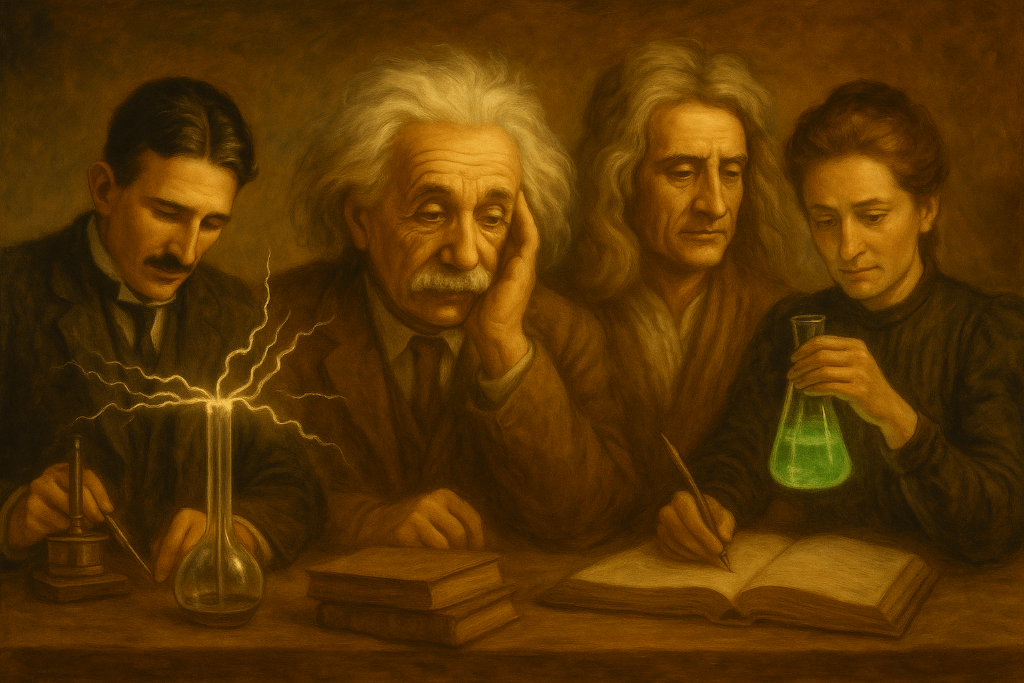
Inspiration From Scientific Journeys
Einstein struggled in school before revolutionizing physics. Curie battled financial hardship and discrimination yet reshaped chemistry. Mendel’s work was ignored for decades before being recognized as foundational to genetics. These stories teach resilience, vision, and patience.
Scientists also show the power of collaboration. Watson and Crick relied on Franklin’s data. Edison depended on a team of inventors. Hawking worked with mathematicians and physicists worldwide. Progress often comes from collective effort, not isolated genius.
By studying their stories, we learn that setbacks are stepping stones, persistence is essential, and curiosity is the engine of innovation. These lessons remain as relevant for entrepreneurs and students as they are for scientists.
Future Scientists: Who Might Be The Next “Famous Scientist”?
Science never stops moving forward. Today’s researchers are tomorrow’s famous scientists, tackling challenges in energy, health, and technology that will define the century.
Emerging Innovators Of Tomorrow
In artificial intelligence, researchers are building machines that can learn, reason, and assist humanity in solving complex problems. In genetics, scientists are editing DNA to cure diseases once thought incurable. In space exploration, new missions aim to take humans to Mars and beyond.
Current scientists to watch include innovators working on renewable energy, quantum computing, and neuroscience. Their work may someday stand alongside the legacies of Newton, Curie, or Turing.
The digital age also accelerates recognition. A discovery can now spread worldwide instantly, ensuring that the next scientists who change the world might be recognized faster than ever before.
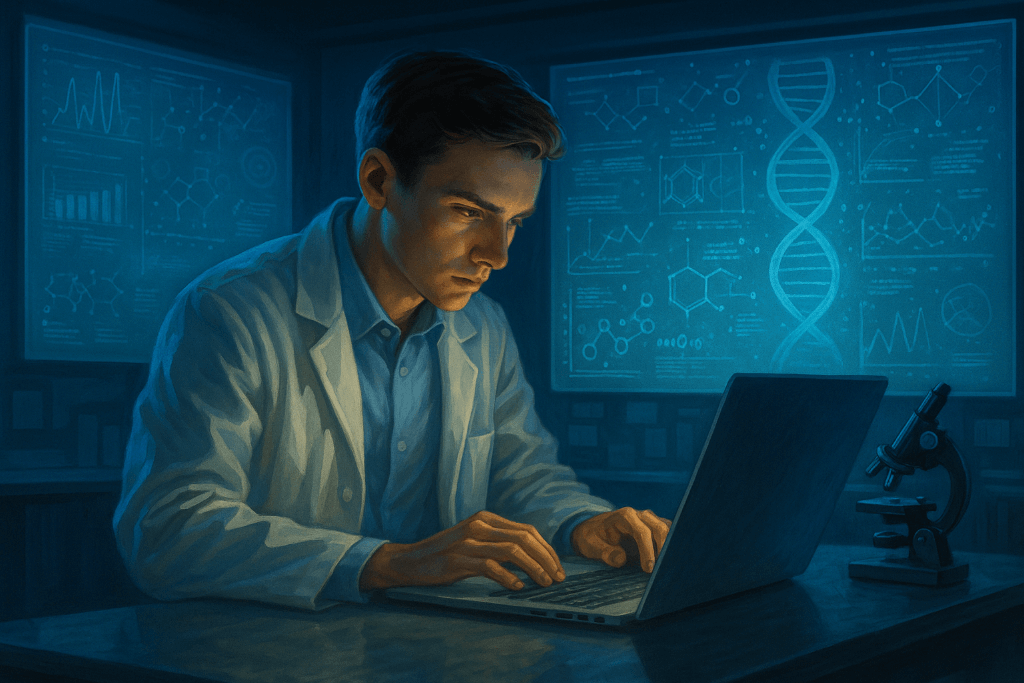
Final Thoughts
From Aristotle to Einstein, from Marie Curie to Ada Lovelace, science has been shaped by remarkable individuals. These famous scientists not only discovered new truths but also inspired humanity to reach further.
Their legacies remind us that science is not complete. It is a story still being written. Each breakthrough builds on the past, creating a chain of discovery that connects generations. By studying their journeys, we inherit not just knowledge but also inspiration: the courage to question, the persistence to endure, and the imagination to create.
Science is humanity’s greatest collective endeavor, and its heroes, both celebrated and unsung, remind us that the pursuit of knowledge is timeless.
FAQs
Who Is Considered The Greatest Scientist Of All Time?
Many consider Isaac Newton or Albert Einstein the greatest. Newton laid the groundwork for physics and calculus, while Einstein reshaped our understanding of space and time.
Which Scientists Changed Medicine?
Louis Pasteur created vaccines, Alexander Fleming discovered antibiotics, and Marie Curie advanced radiation therapy. Together, they transformed health care.
Who Are Some Underrated Scientists?
Rosalind Franklin, Chien-Shiung Wu, and Jagadish Chandra Bose all made transformative contributions yet were overshadowed by others during their lifetimes.
What Qualities Make A Scientist Famous?
Persistence, creativity, and groundbreaking discoveries often define fame. The ability to challenge norms and influence society also plays a role.
Why Should Students Learn About Famous Scientists Today?
Studying them teaches that failure is part of success, curiosity drives progress, and one person’s ideas can transform the world. Their stories inspire the next generation to innovate and dream.
Also Read: Inventions Given To The World For Free: How Shared Innovation Changed Humanity
